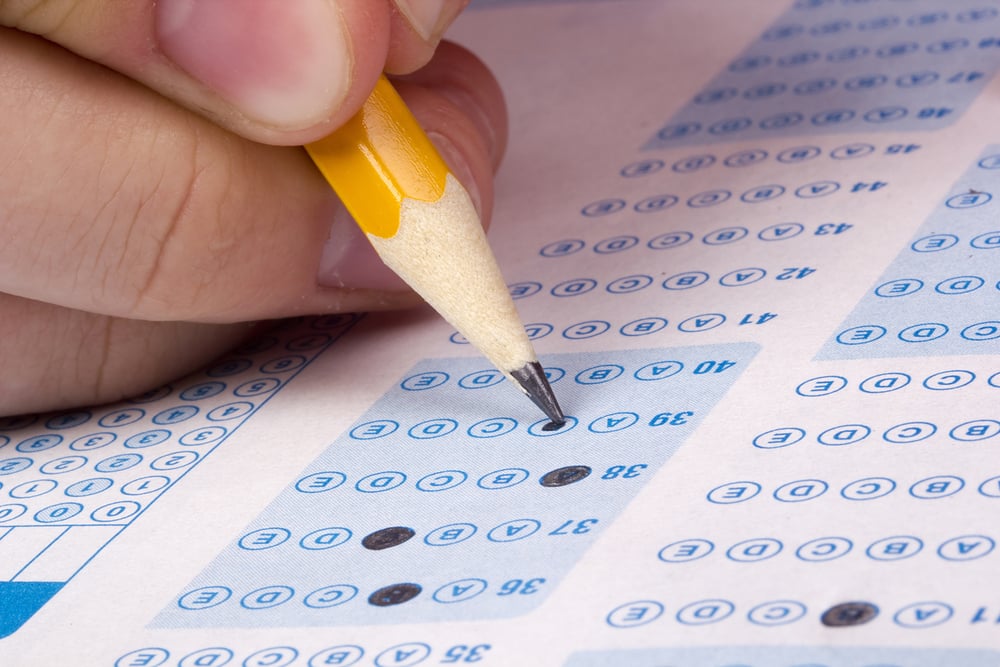As the school year starts, it’s time to open up the word processing program and get to work on a letter for your student’s teachers. Letters should be customized for the particular class, subject, grade, and student’s needs. Here’s a nice example from Trish: “You have our son, *** in your second period AP Lang class. I wanted to give you a heads up that he has an IEP with accommodations. He has been professionally diagnosed by licensed psychologists as intellectually gifted, with dyslexia and dysgraphia. Dyslexia is often referred to as an invisible disability, and ____ has in the past had either his intelligence or his disabilities underestimated, as they can camouflage each other. He is an extremely hard worker, tries hard to overcome […]
Processing Speed & Writing [PREMIUM]
Question: I know my son’s processing speed is slow from his testing, but how slow should his speed on something like writing take? My son has slow processing speed, dyslexia, dysgraphia, and a loose attention control system – but how long should it take him to write a 5 paragraph academic paper… after which the paper still needs revisions? It takes him hours to complete assignments. This is a great question…but of course, the answer depends on a lot of individual factors regarding your student. When essay or paper writing takes so long, it’s good to try to troubleshoot ways to make the process quicker. If the delay occurs at the beginning, before any ‘writing’ occurs, then maybe he doesn’t have a template in which […]
Gifted with Dysgraphia [PREMIUM]
For many, the most frustrating aspect of dyslexia is writing. Writing gets better over time, but it may remain effortful and some will find non-verbal outlets for expression such as drawing, film, building physical objects or managing teams more expressive. Because dyslexic thinkers often have strong associational minds and personal memories, writing difficulties are more likely to be due to difficulty getting information down on paper rather than not having something to say. Common obstacles to writing can be many – narrowing ideas, putting selected ideas into order, putting emotions, complex feeling or perceptions, and experiences into words, then harnessing the physical writing steps and visual memory of words (spelling) to get them down on paper. Students with dysgraphia can be helped by first dramatically reducing […]
Precis Writing … or when less is more
“English A was ‘a disaster and French was like medieval torture. To sit down with a blank piece of paper and write was the most traumatic thing that had ever faced me in life. I had ideas in my head, but I could not get the stuff down. It was a crushing time.” – Charles Schwab “It will be particularly helpful if they give themselves practice in precis writing, paraphrasing, and note-taking. If one has to write a precis one is forced not only to think out carefully what are the key ideas in a particular passage but also to express them concisely, accurately, and clearly. Paraphrasing makes similar demands and also forces one to consider the style of the original and to be critical […]
WHAT YOU CAN LEARN FROM A CHILD’S WRITING [Premium]
There are many skills that are required to write by hand. Besides having an idea and being able to organize it into words, there’s remembering the motor, kinesthetic, and visual sequences of letters and words and being able to discern similar and dissimilar sounds (auditory processing, phonemic awareness). No wonder it’s hard to write! What do you see in the following writing? Mix of capitals and lower case letters, irregular spacing, sight word error (plaid instead of played), phonemic error (chr instead of tr), elision / dropped sound or attention / working memory mistake (chis instead of chips). This student would benefit from working with an alphabet strip of lower and upper case letters in view as well as a spelling or writing […]
Improved College Board Guidelines for Test Accommodations
New from the College Board: "Beginning January 1, 2017, the vast majority of students who are approved for and using testing accommodations at their school through a current Individualized Education Program (IEP) or 504 Plan will have those same accommodations...
Surviving Parent Teacher Conferences [Premium]
Parent-Teaching Conferences can be stressful for both parents and teachers. Keep your eye on the big picture, think strategically, and work toward a positive year for your student in the classroom. Often the amount of time you have with the teacher is quite short because of the total number of students involved. As a result, plan on showing up to see how the beginning of the year is progressing and focus on finding solutions if your students is lagging behind or having difficulties. If you’ve purchase Dyslexia, Dysgraphia, or Dyscalculia Teacher cards, now is a good time to use them. Quick Tips for Parent Teacher Conferences If Your Student is Dyslexic: Make a Positive First Impression – This may be the first time your meeting this teacher and she […]
Question: Does Note-Taking with Spellcheck Help or Hinder Students with Dyslexia ? [Premium]
It’s a question that arises commonly – does spellchecking for students help or hinder when it comes to students and spelling? The concern is that allowing students to use spellcheck on a regular basis in the long run may prevent them learning correct spellings. Should age matter or the presence of dyslexia? What about working memory overload or ADD/ ADHD? The issue is not a trivial one especially because of recent efforts to The issue is not a trivial one especially because of recent efforts to put laptops away in college during lectures based on computer-based vs. traditional note-taking by hand (N.B. this study did not specifically assess dyslexic students – see the NPR story also below). A recent paper by Hiscox and colleagues (see below) […]
[Premium] What to Do If a Reading Curriculum Doesn’t Work
It happens to everybody. You research a curriculum thoroughly or it gets through several levels of a review and then you put it into action and… it just doesn’t connect. What do you do? There are several common reasons why a curriculum doesn’t connect with a particular student – and so some trial and error and modification need to take place. The most common reasons that certain curricula fail for a particular student include: 1. Going Too Fast Because there can be difficulty registering information accurately (sounds, letters, words), a student may need to slow the pace down considerably if the lessons aren’t sinking in. It may seem counterintuitive if you feel a student is slipping farther behind, but reducing work and simplifying […]
Q & A: Can Someone Be Both Dyslexic and Autistic ? [Premium]
QUESTION: Is it Possible to Have Both Dyslexia and Autism? The short answer is yes, but it’s likely not very common and in general many of the features of dyslexia and autism are opposite. By strict criteria, low IQ and autism are excluded from the diagnosis of dyslexia. However, it is not difficult to speculate that a child with family dyslexia could also have autism either through inheritance or through some environmental factor. The main thing to consider is that it may be much more common that a child with dyslexia has social factors unrelated to autism or a child with autism has reading and writing problems unrelated to dyslexia. In fact, typically dyslexic and autistic children have different cognitive, memory, and perceptual patterns although they […]
[Premium] Examples of Dysgraphia and Dyslexia – What to Look For
After dyslexic students make progress in their ability to decode words, parents, teachers, and students themselves may begin to breathe a sigh of relief; however, another monster challenge may be looming on the horizon – the other D…. Dysgraphia. The National Institutes of Health definition of Dysgraphia includes the following: “Dysgraphia is a neurological disorder characterized by writing disabilities. Specifically, the disorder causes a person’s writing to be distorted or incorrect. In children, the disorder generally emerges when they are first introduced to writing. They make inappropriately sized and spaced letters, or write wrong or misspelled words, despite thorough instruction. Children with the disorder may have other learning disabilities; however, they usually have no social or other academic problems. Cases of dysgraphia in adults generally […]
Top Back to School Apps for Dyslexia [Premium]
EARLY READERS Endless Reader by Originator – Free to try; $5.99-11.99 bundles. iPhone and iPad Great for visual learners. Animations and characters help with sight word learning. Orton Gillingham Card Deck by Mayerson Academy FREE. iPhone and iPad Multisensory card deck with consonants, single vowels, consonant digraphs, vowel teams, vowel + r, short vowel signals, VCe, and common suffixes. Auditory drill. Record and playback to hear pronunciations. Video see and hear sounds. Great phonics practice. Sight Words by Little Speller – FREE Iphone and Ipad All 220 sight words, no-frills program that allows you to create your own sight word lists – lower case or upper case letters. Can allow hints. Sight Words Reading and Spelling by Edoki $3.49 Android. Includes 320 sight words (Fryes + Dolce). […]

![[PREMIUM] Letter for Teachers](https://www.dyslexicadvantage.org/wp-content/uploads/2018/12/Screen-Shot-2019-08-30-at-8.57.12-AM.jpg)
![Processing Speed & Writing [PREMIUM]](https://www.dyslexicadvantage.org/wp-content/uploads/2018/02/Screen-Shot-2019-08-30-at-10.47.06-AM.jpg)
![Gifted with Dysgraphia [PREMIUM]](https://www.dyslexicadvantage.org/wp-content/uploads/2017/10/Screen-Shot-2019-09-01-at-7.46.37-AM.jpg)

![WHAT YOU CAN LEARN FROM A CHILD’S WRITING [Premium]](https://www.dyslexicadvantage.org/wp-content/uploads/2017/02/Screen-Shot-2019-09-03-at-2.11.37-PM.jpg)

![Surviving Parent Teacher Conferences [Premium]](https://www.dyslexicadvantage.org/wp-content/uploads/2016/10/parent-teacher-conferences.jpg)
![Question: Does Note-Taking with Spellcheck Help or Hinder Students with Dyslexia ? [Premium]](https://www.dyslexicadvantage.org/wp-content/uploads/2016/10/Screen-Shot-2019-09-09-at-10.45.17-AM.jpg)
![[Premium] What to Do If a Reading Curriculum Doesn’t Work](https://www.dyslexicadvantage.org/wp-content/uploads/2016/09/our-shutterstock-puzzle.jpg)
![Q & A: Can Someone Be Both Dyslexic and Autistic ? [Premium]](https://www.dyslexicadvantage.org/wp-content/uploads/2016/09/dyslexia-autism.jpg)
![[Premium] Examples of Dysgraphia and Dyslexia – What to Look For](https://www.dyslexicadvantage.org/wp-content/uploads/2016/08/dysgraphia-dyslexia.jpg)
![Top Back to School Apps for Dyslexia [Premium]](https://www.dyslexicadvantage.org/wp-content/uploads/2016/08/apps-dyslexia-our-shutterstock.jpg)













